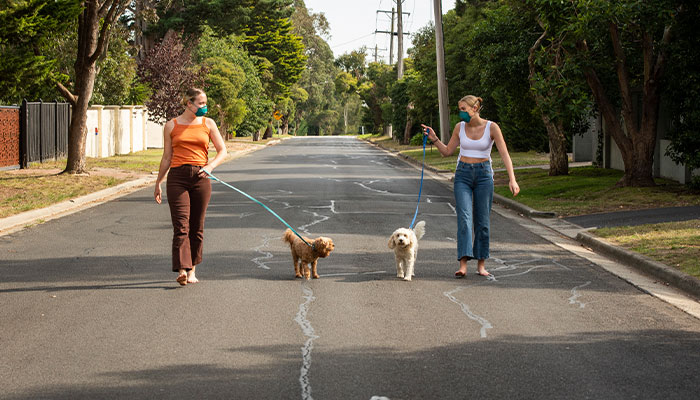People who said being Australian was an important part of their identity were also more likely to follow public health regulations early in the pandemic, a new study has found – information that could prove important in designing future health responses.

Do the right thing: National identity, the researchers said, is a trait that is more associated with mutual co-operation and working towards joint goals.
In mid-2020, researchers from around the world surveyed people in 67 countries, including Australia, New Zealand, the United States and the United Kingdom, to find out which psychological traits were associated with people supporting COVID-19 restrictions.
Associate Professor Mark Alfano, from Macquarie University’s Department of Philosophy, was one of the senior researchers who developed the project, while Dr Robert Ross from Macquarie’s School of Psychological Sciences and Professor Neil Levy from Macquarie’s Department of Philosophy collected Australian data along with academics from several other Australian universities and research centres.
“The study measured traits including national identity, open-mindedness, and trust in institutions, and asked people whether they supported three key areas of the response: hygiene, spatial distancing, and policy decisions like lockdowns, and closing bars and restaurants,” Alfano says.
Identifying strongly with one's nation can lead people to make tremendous sacrifices.
“When we talk about national identity, we aren’t referring to national narcissism – or what you might describe as toxic patriotism – which excludes other countries, but a trait that is more associated with mutual co-operation and working towards joint goals.
“The prediction was that people who identified strongly with the country they lived in would also care about their neighbours, and would therefore be more willing to support the measures put in place to protect their community.
“As we’re now seeing in the defence of Ukraine against Russian invasion, identifying strongly with one's nation can lead people to make tremendous sacrifices as part of collective action on behalf of one's compatriots.
“Taking up arms to defend Kyiv is a heroic example of such cooperation. The solidarity on display during the Melbourne lockdowns is obviously less dramatic, but it too was in part driven by identification with the community."
Aussies' strong sense of national identity
When the study interviews were conducted, the way in which the virus was spreading was less clear, and public health responses had not yet become such a potentially polarising issue.

In this together: The study's prediction was that people who identified strongly with the country they lived in would also care about their neighbours.
At the time, the emphasis was still on hand and surface hygiene, spatial distancing indoors and out, and lockdowns in line with Australia’s policy of total eradication.
As scientists learned more about how the virus behaved, some of the policies put in place early on – like closing public parks and outdoor playgrounds – were shown to be ineffective; others, like mask mandates and vaccination, were not yet in place.
To rate national identity, people were asked how strongly they agreed or disagreed with the statements, “I identify as Australian” and “Being Australian is a part of who I am”.
Australians proved the theory, reporting both a strong sense of national identity and support for the COVID-19 measures.
To rate support for policies, participants were presented with statements such as, “I stay home as much as practically possible”.
A second study reported in the same paper tested the reliability of the self-reported information, comparing it with data on national identity from the World Values Survey, and Google’s community movement data; information from the two studies aligned.
Ross says a strong sense of national identity was shown to be a useful predictor of how supportive people were of the health response across the 67 countries.
“Australians proved the theory, reporting both a strong sense of national identity and support for the COVID-19 measures,” he says.
“We also had the largest sample size of any of the countries involved – more than 2000 people compared to fewer than 200 in some countries – so we have a high degree of confidence in what we found in Australia.
The key trait of open-mindedness
Ross says the information we collected through this study is important, as it could assist in planning the response to future crises.

Extra mile: Australians were willing to support measures, such as social distancing and mask-wearing, put in place to protect their community.
“In particular, it suggests that fostering a positive sense of national identity could help mobilise communities to support policies and engage in behaviours that contribute to the common good during a health crisis like a pandemic.
“It’s that sense of working together, and everyone playing their part.”
The study collected a large amount of data, allowing investigators to analyse a number of psychological traits and how they related to support for those early pandemic measures.
Alfano says they found open-mindedness was consistently an important trait.
“Open-mindedness is a willingness to recognise that other people might know more than we do, or being willing to admit mistakes,” he says.
“Interestingly, other traits were not necessarily predictors for or against support for the health measures – things like national narcissism, the belief that your country is better than others and deserves more recognition and rewards.”
Associate Professor Mark Alfano is an Associate Professor at Macquarie University’s Department of Philosophy and Macquarie’s Centre for Agency, Values and Ethics (CAVE)
Dr Robert Ross is a Research Fellow at Macquarie University’s School of Psychological Sciences and CAVE
Professor Neil Levy is a Professor at Macquarie University’s Department of Philosophy and CAVE



